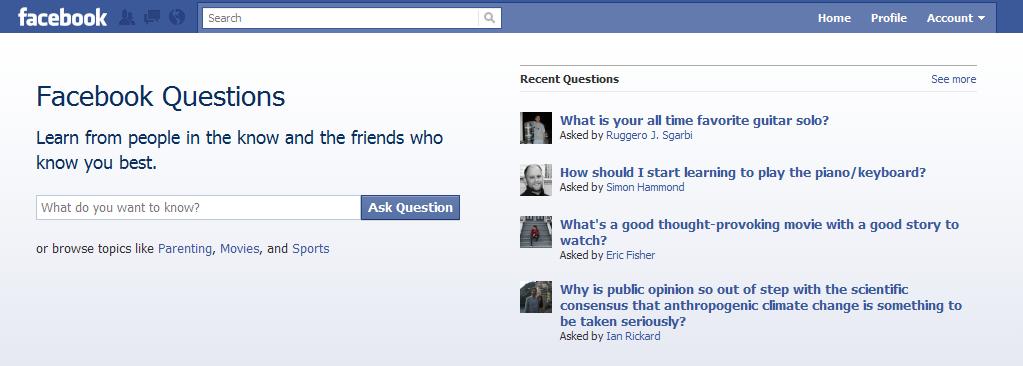 This was my first post for the Small Act blog and was published there last week.
This was my first post for the Small Act blog and was published there last week.
Last week Facebook continued their two trends of appropriating the most successful features of other social networks and making what was once a closed network increasingly public.
This time Facebook has borrowed from LinkedIN Answers, Yahoo Answers and Mahalo.com, all of which allow members to ask and answer questions, building a collaborative, searchable, repository of knowledge and opinions. Beginning with a first cohort of members last week Facebook is rolling out its own Q&A platform in for the form of “Facebook Questions”.
As with anything it does Facebook’s demographic mass with a community over 500 million strong makes this move incredibly significant. The usage of this service will in all likelihood rapidly surpass those of its rivals. All content within Facebook Questions will be completely public which will bring significant amounts of search traffic.
I think this is a smart, exciting and coherent extension of the Facebook platform. People already use their status updates to constantly ask questions of each other. And anyone who wants to continue limiting their questions to their friends, which will be the case for the vast majority of these updates, can continue to do exactly what they’re doing. But if your question is of a more general nature; “Where is the best pizza in Washington, DC?”, “What’s the best company to work for in America?” or “Why do you not eat meat?”, then you might benefit from making it public, and discovering what the citizens of Facebook at large think. In that case you would ask it as a “Question”, a new option you can select below the profile update box.
What makes the Facebook service particularly compelling is that it is contextual: if I ask a question about Google my friends who work at Google will see I and if I ask a question about San Francisco my friends who live there will see it, and so on. This context and integration with our Facebook network will ensure the success of Facebook Question.
So what does this mean for citizen sector organizations? Simply put, it’s another chance to engage your community in a meaningful way. Already many organizations use their Facebook Pages and Twitter accounts as consultation tools; this will be another valuable avenue to seek the input and opinions of your members, supporters and the community at large, and anything that allows you to do that at the scale Facebook represents is of enormous value. As your community responds they will also be sharing your question through their Facebook network, further expanding your reach.
As Facebook Questions has only been made available to a limited number of Facebook members so far (and aspects of it are still buggy) we don’t know yet if businesses and organizations will be able to pose questions or provide answers directly via their Pages. I hope so, and it would make sense for Facebook to allow this. The alternative would be staff spokespeople. And regardless of who an organization chooses to manage this interaction their staff will inevitably be drawn into responding to Questions that match their employer, issues of interest and hobbies or are asked by their friends.
As is true on other social networks, if a passionate group of people are discussing your issue you should (respectfully, humbly, openly) participate. You could learn a lot from the Facebook community and they could learn a lot from you. As a platform for aggressive advocacy I do not think it will work. But as a platform for educating it will be excellent. When you add value by educating, when you provide links to relevant information and stories, when you don’t ask for anything in return, you create trust, which leads to attention and support. In these respects Facebook Questions could big another valuable tool in the portfolio of socially-connected organizations.